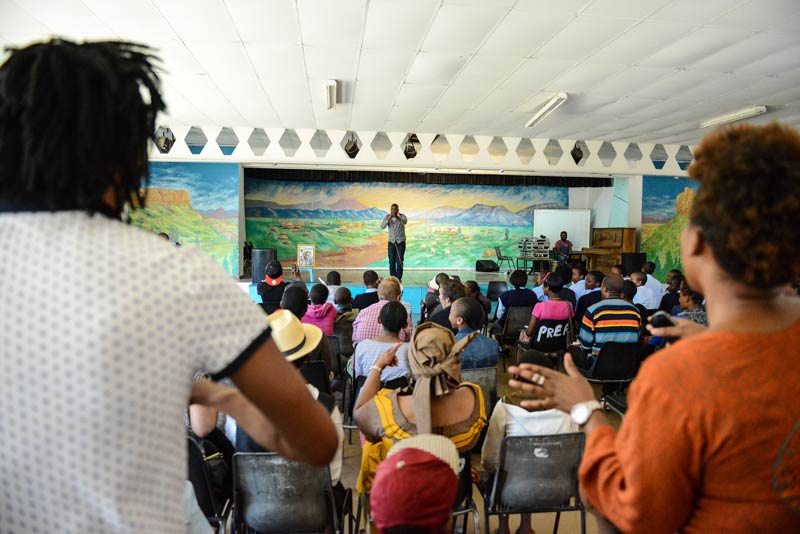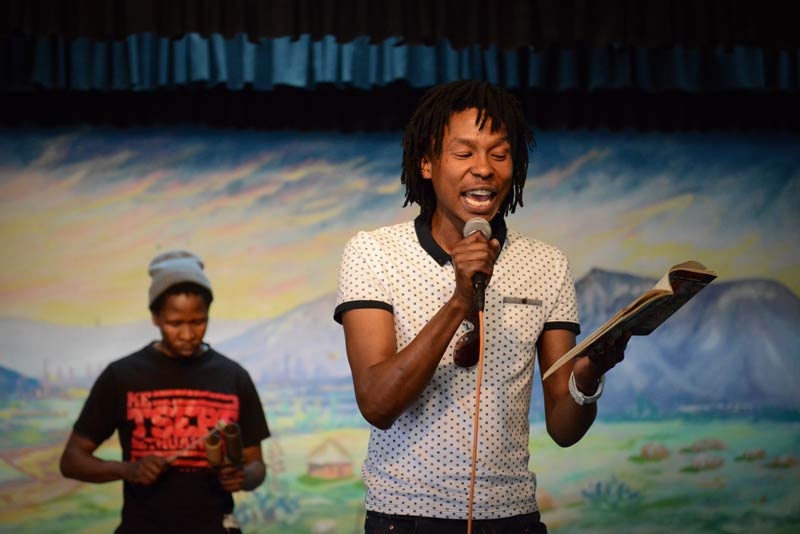
Lesotho is an interesting place to be in at the moment. At the end of August, we made headlines worldwide, unfortunately for the wrong reasons. The news had nothing to do with the country’s many unique and positive qualities. There was no mention of natural beauty, of Basotho culture, or of the many exciting initiatives that a host of organisations and individuals in the country are working hard on.
Instead, it focused on the country’s current political mess. An apparent attempted military ‘coup’ took place, and the Prime Minister fled to South Africa. Tom Thabane is back in the country now, but political tensions remain high, with no clear resolutions in sight. Everyday life continues, but people are tense, confused, and many fear a repeat of the political violence that the country experienced in 1998.
In the midst of this uncertainty and political instability, the weekend of 5 – 7 September saw the return of Ba re e ne re Literature Festival, the only event of its kind in Lesotho, founded in 2011 by the late Liepollo Rantekoa, a young Mosotho literary enthusiast who passed away in a tragic car accident in 2012.
Inspired by Rantekoa’s vision of a movement that would reignite a culture of reading and writing in Lesotho, and especially an appreciation of Sesotho language and literature, a group of her friends and family have come together and are continuing with the work she began.
This year, a number of writers from outside Lesotho were invited to take part in the festival. These included South African novelist Niq Mhlongo, Nigerian/Barbadian writer Yewande Omotoso, and Namibian poet Keamogetsi Molapong. Cape Town-based Chimurenga Magazine jumped on board as the event’s official partner. International authors were joined by a number of writers from Lesotho, including Mpho Makara, Teboho Rantsoabe and Patrick Bereng.
The festival’s opening ceremony took place at the same time that a political march was held through the centre of Maseru. Night-time events were cancelled in the face of potential security threats. But despite these challenges, people of all ages came out to enjoy the day-time events, which featured a vibrant combination of live music, poetry readings, storytelling performances and discussions with authors.
Nobody ignored the political situation in the country. On the contrary, the challenges that Lesotho currently faces became a crucial talking point, as guests and participants spoke of the role that artists, writers and literature can play in times such as these. The final event of the second day of the festival saw people of all ages sitting in a tight circle around a small computer screen, laughing together at jokes told by renowned South African author Zakes Mda (addressed by the audience as ‘Ntate Zakes’) who, although unable to be present in person, joined the festival via Skype.
Mda spoke with strength and encouragement to the professional and aspirant writers in the room: “You writers will always play a critical role in the country. Artists can be catalysts for change.”

Later, Mhlongo commented: “The festival happened at the right time to bring people together, to give them the chance to express themselves, to express their frustrations, and to interact with others. Writers can go beyond the boundaries of political and cultural divisions. Writers can liberate, especially in times of turmoil like this.”
Teboho Moekoa, a local artist, performed a poem that spoke blatantly and scathingly about Lesotho’s current politics: “My people seem mentally possessed / by the same system that keeps them suppressed / And every time they protest / It’s the voter that the voted cannot respect…”
“We are black youth trying to find our position in the system, trying to find definitions that have already been defined for us,” said Moekoa. “It’s very important that something like this is happening in Lesotho. We don’t have a platform here, and this festival provides that platform.”
Intelligent and outspoken writing, however, can only be truly powerful if it is widely read. In a country with one of Africa’s highest literacy rates (over 90% amongst women, according to Unesco), the serious lack of a reading culture in Lesotho was a prominent topic of discussion. Festival director Lineo Segoete addressed the issue directly: “People in Lesotho have developed an attitude that reading is only important for school, without realising that successful people are avid readers. We want people to learn the importance of reading for pleasure, of reading to self-educate. We are challenging everyone to get back to reading.”
Questions surrounding identity, language and culture permeated the weekend. Mosotho author Mpho Makara spoke of her decision to only write in Sesotho, but nonetheless encouraged young writers to abandon false notions of ‘pure’ Sesotho: “Language cannot afford to stand still. English borrows words from other languages. In the same way, we can steal from English and make Sesotho grow. Write in the Sesotho you know, in the Sesotho you speak every day.”
Mhlongo offered a different take on the language debate. Mhlongo chooses to write his novels in English, and argued that writers should be allowed to write in whatever language they feel comfortable in: “Storytelling doesn’t have a language. It’s like music. The message is the most important thing. Whatever the language, the important thing is to preserve culture. I believe that you can write about your culture in English.”
The focus of day three of the festival shifted to more practical issues, with the authors discussing writing techniques, and sharing tips and advice with the audience.
“The hunger here is evident,” remarked Mhlongo when I chatted with him later. “There’s an obvious interest in writing. School kids filled the hall. A filled hall is a rare thing in literary events!”
Addressing the audience directly, he urged the young writers in the room: “You in Lesotho need to write about your challenges. I hope that after this we are going to see novels and short stories coming from Lesotho.”
Ba re e ne re boomed with engagement, enthusiasm and positivity. The energy was palpable. Soon, we hope, the eyes of the world will turn to Lesotho for the right reasons.
Leila Hall is a freelance writer living and working in Lesotho.
